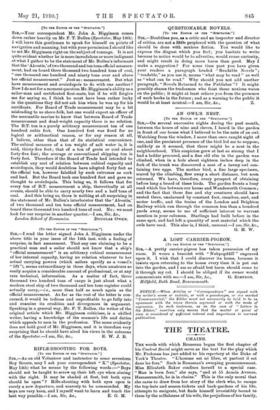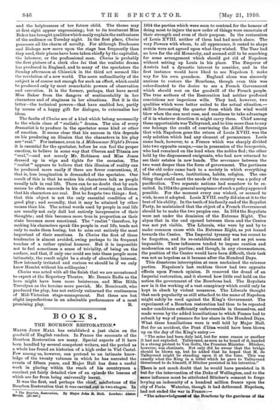THE THEATRE.
CHAINS.
Tim words with which Rousseau began the first chapter of his Contrat Social might serve as the text for the play which Mr. Frohman has just added to his repertory at the Duke of York's Theatre. " L'homme est ne libre, et partout it est dana les fers." Such is Rousseau's sweeping pronouncement. Miss Elizabeth Baker confines herself to a special case. "Man is born free," she says, "and at 55 Acacia Avenue, Hammersmith, he is in chains." Ibis is the only moral that she cares to draw from her story of the clerk who, to escape the top-hats and season-tickets and back-gardens of his life, attempts to emigrate, but finds himself irresistibly bound to them by the selfishness of his wife, the prejudices of her family,
and the helplessness of her future child. The theme may at first sight appear unpromising; but to its treatment Miss Baker has brought qualities which easily explain the enthusiasm of the audience on Tuesday night. In the first place, Chains possesses all the charm of novelty. For although Duchesses and Bishops now move upon the stage less frequently than they used, their places have been taken chiefly by the capitalist, the labourer, or the professional man. Chains is probably the first picture of a clerk chez lui that the realistic drama has produced in England, and to many of the spectators the Sunday afternoon at Chiswick in the third act seemed like the revelation of a new world. The mere unfamiliarity of the subject is of course not enough for such an effect, which could be produced only by most remarkable powers of observation and execution. It is the former, perhaps, that have saved Miss Baker from the dangers of sentimentality in her characters and of staginess in her situations. But it is the latter—the technical powers—that have enabled her, partly by means of a happy gift for dialogue, to externalise her ideas.
The faults of Chains are of a kind which belong necessarily to the whole class of " realistic " drama. The aim of every dramatist is to produce in the spectator some kind or other of emotion. It seems clear that his success in this depends on his producing an illusion that the characters in his play are "real." For instance, even in A Midsummer Night's Dream it is essential for the spectator, before he can feel the proper emotion, to believe in some way that Oberon and Titania are "real,"—and not merely Mr. Robinson and Miss Jones dressed up in wigs and tights for the occasion. The "realist" appears to believe that this illusion of reality can be produced more easily if there are fewer conventions, if, that is, less imagination is demanded of the spectator. One result of this is that he makes his characters talk as people usually talk in real life. There can be no doubt that by such means he often succeeds in his object of creating an illusion that his characters are real. But he forgets two things : first, that this object is not the only essential condition of a good play ; and secondly, that it may be attained by other means than his. The actual words used by people in real life are usually not only dull but entirely inexpressive of their thoughts ; and this becomes more true in proportion as their state becomes more emotional. The " realist " therefore, by making his characters speak like people in real life, tends not only to make them boring, but to miss out entirely the most important of their emotions. In Chains the first of these tendencies is almost avoided, owing perhaps to its frequent touches of a rather cynical humour. But it is impossible not to feel sometimes a sense of triviality, of being on the surface, and that, if only one could see into these people more intimately, the result might be a study of absorbing interest. How intensely irritated and curious we should be if we only knew Hamlet without his soliloquies Chains was acted with all the finish that we are accustomed to expect at the Repertory Theatre. Mr. Dennis Eadie as the hero might have been more boisterous, and Miss Hilda Trevelyan as the heroine more peevish. Mr. Boucicault, who produced the play, has not entirely unlearned the restlessness of Mid-Victorian stage-management. But these are but slight imperfections in an admirable performance of a most







































 Previous page
Previous page